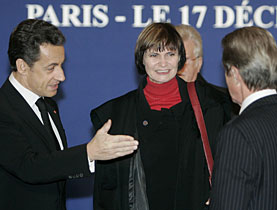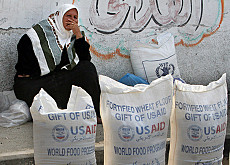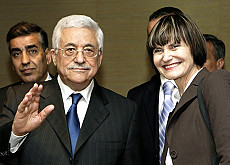Palestinians win pledge for financial aid

An international conference of donors, including Switzerland, has pledged $7.4 billion (SFr8.5 billion) in much-needed financial support to the Palestinian government.
Switzerland’s contribution of SFr83 million over the next three years is destined for reforms of the governing bodies and humanitarian aid.
At a meeting with her Palestinian counterpart, Mahmoud Abbas, in Paris on Monday, Swiss President Micheline Calmy-Rey pointed out the importance of protecting the civilian population.
Switzerland, which describes itself as a major donor state, has been committed to supporting the Palestinian civilian population for many years, according to a foreign ministry statement.
It is increasing its current aid contribution to the Palestinian state by nearly 40 per cent, a spokesman said.
European Union commissioner Benita Ferrero-Waldner told Swiss public television she was pleased to see the Swiss pledge, but added she hoped a “such a wealthy country would be even more generous in the future”.
Checkpoints
Switzerland has carried out a programme valued at more than SFr20 million a year and has targeted the needs of the local population as part of its cooperation and development activities in the region.
The Swiss Agency for Cooperation and Development (SDC) continues to maintain a presence in the Occupied Territories.
In another move, Mario Carera, head of the Swiss cooperation office for the Palestinian Territories, has called for Israeli checkpoints in the region to be scrapped.
He said the 1.5 million people in the Gaza Strip had been completely cut off from the outside world and depended on mercy of Israel since June.
In an interview with Swiss public radio, Carera pointed out that there are 550 Israeli checkpoints in the occupied West Bank.
Above expectations
The French foreign minister, Bernard Kouchner, said the sum raised on Monday beat the Palestinians’ own expectations.
“Our goal had been for $5.6 billion. Now we have $7.4 billion. The real winner today is the Palestinian state,” he said at the end of the one-day meeting in Paris which was attended by representatives of nearly 90 countries and organisations.
The conference is the financial sequel to last month’s meeting in Annapolis, Maryland, that launched the first Israeli-Palestinian peace talks in seven years.
The EU offered $640 million of grant aid for the Palestinians. The United States pledged some $555 million while French President Nicolas Sarkozy vowed to contribute $300 million.
The funds are expected to revive the moribund Palestinian economy and strengthen Western-backed President Abbas in a struggle with Hamas Islamists.
“This conference is literally the Palestinian government’s last hope to avoid bankruptcy,” said American Secretary of State Condoleezza Rice.
Drop in income
A World Food Programme survey published on Monday, found household income in Gaza has fallen 30 per cent over the past six months. The survey said about 70 per cent of non-refugee households earned less than $1.2 per person per day.
But experts say the challenges for the Palestinian authorities go beyond finances.
Hamas, which opposes peace talks, seized control of the Gaza Strip in June and Israel antagonised Palestinians by announcing plans to expand a settlement near Jerusalem by around 300 homes.
Israeli Foreign Minister Tzipi Livni reiterated Israel’s intent to live up to the 2003 US-backed “road map ” peace plan that demands it freeze settlement activity.
In her speech she stood firm on checkpoints which Israel has refused to lift, citing security concerns.
swissinfo with agencies
The SDC programme in Gaza and the West Bank has three priorities:
Enhancing prospects for peace: improving respect for human rights and supporting civil society organisations that provide legal aid to the population. Capacity building with focus on youth and women.
Improving living conditions: initiatives to help the psycho-social wellbeing of vulnerable populations. Development of employment generation programmes.
Promoting viable and sustainable institutions: maintaining the focus on civil society partners that have a strong record in good governance, gender sensitivity and management.

In compliance with the JTI standards
More: SWI swissinfo.ch certified by the Journalism Trust Initiative


You can find an overview of ongoing debates with our journalists here . Please join us!
If you want to start a conversation about a topic raised in this article or want to report factual errors, email us at english@swissinfo.ch.